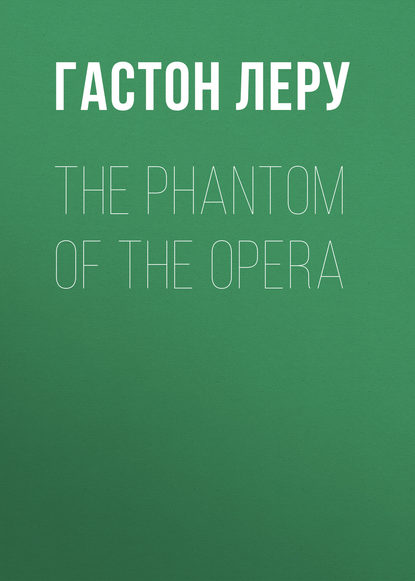По всем вопросам обращайтесь на: info@litportal.ru
(©) 2003-2024.
✖
The Phantom of the Opera
Автор
Год написания книги
2018
Настройки чтения
Размер шрифта
Высота строк
Поля
"Holy angel, in Heaven blessed,My spirit longs with thee to rest!"
Raoul, his throat filled with sobs, oaths and insults, fumbled awkwardly at the great mirror that had opened one night, before his eyes, to let Christine pass to the murky dwelling below. He pushed, pressed, groped about, but the glass apparently obeyed no one but Erik … Perhaps actions were not enough with a glass of the kind? Perhaps he was expected to utter certain words? When he was a little boy, he had heard that there were things that obeyed the spoken word!
Suddenly, Raoul remembered something about a gate opening into the Rue Scribe, an underground passage running straight to the Rue Scribe from the lake … Yes, Christine had told him about that… And, when he found that the key was no longer in the box, he nevertheless ran to the Rue Scribe. Outside, in the street, he passed his trembling hands over the huge stones, felt for outlets … met with iron bars … were those they? … Or these? … Or could it be that air-hole? … He plunged his useless eyes through the bars … How dark it was in there! … He listened … All was silence! … He went round the building … and came to bigger bars, immense gates! … It was the entrance to the Cour de l'Administration.
Raoul rushed into the doorkeeper's lodge.
"I beg your pardon, madame, could you tell me where to find a gate or door, made of bars, iron bars, opening into the Rue Scribe … and leading to the lake? … You know the lake I mean? … Yes, the underground lake … under the Opera."
"Yes, sir, I know there is a lake under the Opera, but I don't know which door leads to it. I have never been there!"
"And the Rue Scribe, madame, the Rue Scribe? Have you never been to the Rue Scribe?"
The woman laughed, screamed with laughter! Raoul darted away, roaring with anger, ran up-stairs, four stairs at a time, down-stairs, rushed through the whole of the business side of the opera-house, found himself once more in the light of the stage.
He stopped, with his heart thumping in his chest: suppose Christine Daae had been found? He saw a group of men and asked:
"I beg your pardon, gentlemen. Could you tell me where Christine Daae is?"
And somebody laughed.
At the same moment the stage buzzed with a new sound and, amid a crowd of men in evening-dress, all talking and gesticulating together, appeared a man who seemed very calm and displayed a pleasant face, all pink and chubby-cheeked, crowned with curly hair and lit up by a pair of wonderfully serene blue eyes. Mercier, the acting-manager, called the Vicomte de Chagny's attention to him and said:
"This is the gentleman to whom you should put your question, monsieur. Let me introduce Mifroid, the commissary of police."
"Ah, M. le Vicomte de Chagny! Delighted to meet you, monsieur," said the commissary. "Would you mind coming with me? … And now where are the managers? … Where are the managers?"
Mercier did not answer, and Remy, the secretary, volunteered the information that the managers were locked up in their office and that they knew nothing as yet of what had happened.
"You don't mean to say so! Let us go up to the office!"
And M. Mifroid, followed by an ever-increasing crowd, turned toward the business side of the building. Mercier took advantage of the confusion to slip a key into Gabriel's hand:
"This is all going very badly," he whispered. "You had better let Mother Giry out."
And Gabriel moved away.
They soon came to the managers' door. Mercier stormed in vain: the door remained closed.
"Open in the name of the law!" commanded M. Mifroid, in a loud and rather anxious voice.
At last the door was opened. All rushed in to the office, on the commissary's heels.
Raoul was the last to enter. As he was about to follow the rest into the room, a hand was laid on his shoulder and he heard these words spoken in his ear:
"ERIK'S SECRETS CONCERN NO ONE BUT HIMSELF!"
He turned around, with a stifled exclamation. The hand that was laid on his shoulder was now placed on the lips of a person with an ebony skin, with eyes of jade and with an astrakhan cap on his head: the Persian! The stranger kept up the gesture that recommended discretion and then, at the moment when the astonished viscount was about to ask the reason of his mysterious intervention, bowed and disappeared.
Chapter XVI Mme. Giry's Astounding Revelationsas to Her Personal Relations with the Opera Ghost
Before following the commissary into the manager's office I must describe certain extraordinary occurrences that took place in that office which Remy and Mercier had vainly tried to enter and into which MM. Richard and Moncharmin had locked themselves with an object which the reader does not yet know, but which it is my duty, as an historian, to reveal without further postponement.
I have had occasion to say that the managers' mood had undergone a disagreeable change for some time past and to convey the fact that this change was due not only to the fall of the chandelier on the famous night of the gala performance.
The reader must know that the ghost had calmly been paid his first twenty thousand francs. Oh, there had been wailing and gnashing of teeth, indeed! And yet the thing had happened as simply as could be.
One morning, the managers found on their table an envelope addressed to "Monsieur O. G. (private)" and accompanied by a note from O. G. himself:
The time has come to carry out the clause in the memorandum-book. Please put twenty notes of a thousand francs each into this envelope, seal it with your own seal and hand it to Mme. Giry, who will do what is necessary.
The managers did not hesitate; without wasting time in asking how these confounded communications came to be delivered in an office which they were careful to keep locked, they seized this opportunity of laying hands, on the mysterious blackmailer. And, after telling the whole story, under the promise of secrecy, to Gabriel and Mercier, they put the twenty thousand francs into the envelope and without asking for explanations, handed it to Mme. Giry, who had been reinstated in her functions. The box-keeper displayed no astonishment. I need hardly say that she was well watched. She went straight to the ghost's box and placed the precious envelope on the little shelf attached to the ledge. The two managers, as well as Gabriel and Mercier, were hidden in such a way that they did not lose sight of the envelope for a second during the performance and even afterward, for, as the envelope had not moved, those who watched it did not move either; and Mme. Giry went away while the managers, Gabriel and Mercier were still there. At last, they became tired of waiting and opened the envelope, after ascertaining that the seals had not been broken.
At first sight, Richard and Moncharmin thought that the notes were still there; but soon they perceived that they were not the same. The twenty real notes were gone and had been replaced by twenty notes, of the "Bank of St. Farce"![2 - Flash notes drawn on the "Bank of St. Farce" in France correspond with those drawn on the "Bank of Engraving" in England.—Translator's Note.]
The managers' rage and fright were unmistakable. Moncharmin wanted to send for the commissary of police, but Richard objected. He no doubt had a plan, for he said:
"Don't let us make ourselves ridiculous! All Paris would laugh at us. O. G. has won the first game: we will win the second."
He was thinking of the next month's allowance.
Nevertheless, they had been so absolutely tricked that they were bound to suffer a certain dejection. And, upon my word, it was not difficult to understand. We must not forget that the managers had an idea at the back of their minds, all the time, that this strange incident might be an unpleasant practical joke on the part of their predecessors and that it would not do to divulge it prematurely. On the other hand, Moncharmin was sometimes troubled with a suspicion of Richard himself, who occasionally took fanciful whims into his head. And so they were content to await events, while keeping an eye on Mother Giry. Richard would not have her spoken to.
"If she is a confederate," he said, "the notes are gone long ago. But, in my opinion, she is merely an idiot."
"She's not the only idiot in this business," said Moncharmin pensively.
"Well, who could have thought it?" moaned Richard. "But don't be afraid … next time, I shall have taken my precautions."
The next time fell on the same day that beheld the disappearance of Christine Daae. In the morning, a note from the ghost reminded them that the money was due. It read:
Do just as you did last time. It went very well. Put the twenty thousand in the envelope and hand it to our excellent Mme. Giry.
And the note was accompanied by the usual envelope. They had only to insert the notes.
This was done about half an hour before the curtain rose on the first act of Faust. Richard showed the envelope to Moncharmin. Then he counted the twenty thousand-franc notes in front of him and put the notes into the envelope, but without closing it.
"And now," he said, "let's have Mother Giry in."
The old woman was sent for. She entered with a sweeping courtesy. She still wore her black taffeta dress, the color of which was rapidly turning to rust and lilac, to say nothing of the dingy bonnet. She seemed in a good temper. She at once said:
"Good evening, gentlemen! It's for the envelope, I suppose?"
"Yes, Mme. Giry," said Richard, most amiably. "For the envelope … and something else besides."
"At your service, M. Richard, at your service. And what is the something else, please?"
"First of all, Mme. Giry, I have a little question to put to you."
Raoul, his throat filled with sobs, oaths and insults, fumbled awkwardly at the great mirror that had opened one night, before his eyes, to let Christine pass to the murky dwelling below. He pushed, pressed, groped about, but the glass apparently obeyed no one but Erik … Perhaps actions were not enough with a glass of the kind? Perhaps he was expected to utter certain words? When he was a little boy, he had heard that there were things that obeyed the spoken word!
Suddenly, Raoul remembered something about a gate opening into the Rue Scribe, an underground passage running straight to the Rue Scribe from the lake … Yes, Christine had told him about that… And, when he found that the key was no longer in the box, he nevertheless ran to the Rue Scribe. Outside, in the street, he passed his trembling hands over the huge stones, felt for outlets … met with iron bars … were those they? … Or these? … Or could it be that air-hole? … He plunged his useless eyes through the bars … How dark it was in there! … He listened … All was silence! … He went round the building … and came to bigger bars, immense gates! … It was the entrance to the Cour de l'Administration.
Raoul rushed into the doorkeeper's lodge.
"I beg your pardon, madame, could you tell me where to find a gate or door, made of bars, iron bars, opening into the Rue Scribe … and leading to the lake? … You know the lake I mean? … Yes, the underground lake … under the Opera."
"Yes, sir, I know there is a lake under the Opera, but I don't know which door leads to it. I have never been there!"
"And the Rue Scribe, madame, the Rue Scribe? Have you never been to the Rue Scribe?"
The woman laughed, screamed with laughter! Raoul darted away, roaring with anger, ran up-stairs, four stairs at a time, down-stairs, rushed through the whole of the business side of the opera-house, found himself once more in the light of the stage.
He stopped, with his heart thumping in his chest: suppose Christine Daae had been found? He saw a group of men and asked:
"I beg your pardon, gentlemen. Could you tell me where Christine Daae is?"
And somebody laughed.
At the same moment the stage buzzed with a new sound and, amid a crowd of men in evening-dress, all talking and gesticulating together, appeared a man who seemed very calm and displayed a pleasant face, all pink and chubby-cheeked, crowned with curly hair and lit up by a pair of wonderfully serene blue eyes. Mercier, the acting-manager, called the Vicomte de Chagny's attention to him and said:
"This is the gentleman to whom you should put your question, monsieur. Let me introduce Mifroid, the commissary of police."
"Ah, M. le Vicomte de Chagny! Delighted to meet you, monsieur," said the commissary. "Would you mind coming with me? … And now where are the managers? … Where are the managers?"
Mercier did not answer, and Remy, the secretary, volunteered the information that the managers were locked up in their office and that they knew nothing as yet of what had happened.
"You don't mean to say so! Let us go up to the office!"
And M. Mifroid, followed by an ever-increasing crowd, turned toward the business side of the building. Mercier took advantage of the confusion to slip a key into Gabriel's hand:
"This is all going very badly," he whispered. "You had better let Mother Giry out."
And Gabriel moved away.
They soon came to the managers' door. Mercier stormed in vain: the door remained closed.
"Open in the name of the law!" commanded M. Mifroid, in a loud and rather anxious voice.
At last the door was opened. All rushed in to the office, on the commissary's heels.
Raoul was the last to enter. As he was about to follow the rest into the room, a hand was laid on his shoulder and he heard these words spoken in his ear:
"ERIK'S SECRETS CONCERN NO ONE BUT HIMSELF!"
He turned around, with a stifled exclamation. The hand that was laid on his shoulder was now placed on the lips of a person with an ebony skin, with eyes of jade and with an astrakhan cap on his head: the Persian! The stranger kept up the gesture that recommended discretion and then, at the moment when the astonished viscount was about to ask the reason of his mysterious intervention, bowed and disappeared.
Chapter XVI Mme. Giry's Astounding Revelationsas to Her Personal Relations with the Opera Ghost
Before following the commissary into the manager's office I must describe certain extraordinary occurrences that took place in that office which Remy and Mercier had vainly tried to enter and into which MM. Richard and Moncharmin had locked themselves with an object which the reader does not yet know, but which it is my duty, as an historian, to reveal without further postponement.
I have had occasion to say that the managers' mood had undergone a disagreeable change for some time past and to convey the fact that this change was due not only to the fall of the chandelier on the famous night of the gala performance.
The reader must know that the ghost had calmly been paid his first twenty thousand francs. Oh, there had been wailing and gnashing of teeth, indeed! And yet the thing had happened as simply as could be.
One morning, the managers found on their table an envelope addressed to "Monsieur O. G. (private)" and accompanied by a note from O. G. himself:
The time has come to carry out the clause in the memorandum-book. Please put twenty notes of a thousand francs each into this envelope, seal it with your own seal and hand it to Mme. Giry, who will do what is necessary.
The managers did not hesitate; without wasting time in asking how these confounded communications came to be delivered in an office which they were careful to keep locked, they seized this opportunity of laying hands, on the mysterious blackmailer. And, after telling the whole story, under the promise of secrecy, to Gabriel and Mercier, they put the twenty thousand francs into the envelope and without asking for explanations, handed it to Mme. Giry, who had been reinstated in her functions. The box-keeper displayed no astonishment. I need hardly say that she was well watched. She went straight to the ghost's box and placed the precious envelope on the little shelf attached to the ledge. The two managers, as well as Gabriel and Mercier, were hidden in such a way that they did not lose sight of the envelope for a second during the performance and even afterward, for, as the envelope had not moved, those who watched it did not move either; and Mme. Giry went away while the managers, Gabriel and Mercier were still there. At last, they became tired of waiting and opened the envelope, after ascertaining that the seals had not been broken.
At first sight, Richard and Moncharmin thought that the notes were still there; but soon they perceived that they were not the same. The twenty real notes were gone and had been replaced by twenty notes, of the "Bank of St. Farce"![2 - Flash notes drawn on the "Bank of St. Farce" in France correspond with those drawn on the "Bank of Engraving" in England.—Translator's Note.]
The managers' rage and fright were unmistakable. Moncharmin wanted to send for the commissary of police, but Richard objected. He no doubt had a plan, for he said:
"Don't let us make ourselves ridiculous! All Paris would laugh at us. O. G. has won the first game: we will win the second."
He was thinking of the next month's allowance.
Nevertheless, they had been so absolutely tricked that they were bound to suffer a certain dejection. And, upon my word, it was not difficult to understand. We must not forget that the managers had an idea at the back of their minds, all the time, that this strange incident might be an unpleasant practical joke on the part of their predecessors and that it would not do to divulge it prematurely. On the other hand, Moncharmin was sometimes troubled with a suspicion of Richard himself, who occasionally took fanciful whims into his head. And so they were content to await events, while keeping an eye on Mother Giry. Richard would not have her spoken to.
"If she is a confederate," he said, "the notes are gone long ago. But, in my opinion, she is merely an idiot."
"She's not the only idiot in this business," said Moncharmin pensively.
"Well, who could have thought it?" moaned Richard. "But don't be afraid … next time, I shall have taken my precautions."
The next time fell on the same day that beheld the disappearance of Christine Daae. In the morning, a note from the ghost reminded them that the money was due. It read:
Do just as you did last time. It went very well. Put the twenty thousand in the envelope and hand it to our excellent Mme. Giry.
And the note was accompanied by the usual envelope. They had only to insert the notes.
This was done about half an hour before the curtain rose on the first act of Faust. Richard showed the envelope to Moncharmin. Then he counted the twenty thousand-franc notes in front of him and put the notes into the envelope, but without closing it.
"And now," he said, "let's have Mother Giry in."
The old woman was sent for. She entered with a sweeping courtesy. She still wore her black taffeta dress, the color of which was rapidly turning to rust and lilac, to say nothing of the dingy bonnet. She seemed in a good temper. She at once said:
"Good evening, gentlemen! It's for the envelope, I suppose?"
"Yes, Mme. Giry," said Richard, most amiably. "For the envelope … and something else besides."
"At your service, M. Richard, at your service. And what is the something else, please?"
"First of all, Mme. Giry, I have a little question to put to you."

















